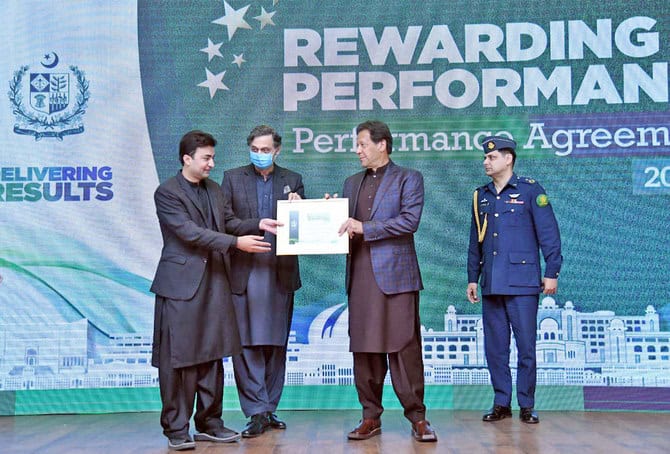ISLAMABAD – Soon after Pakistani Prime Minister Imran Khan awarded ministers for their outstanding performance, key ministries that failed to enter the top 10 category questioned the government’s evaluation criteria.
Prime Minister Imran Khan on Thursday awarded 10 ministers with appreciation certificates for their outstanding performance, but key ministries like finance, information, foreign affairs and health failed to make their mark.
The evaluation committee based its assessment on the achievement of targets set by the government a year ago and didn’t take moving targets into consideration, officials said.
“During this evaluation, they have simply checked the progress on KPIs (Key Performance Indicators) that were given one year back and they have not taken into consideration those challenges which came before us after changing economic and regional situation,” says Muzammil Aslam, a spokesperson for the finance ministry, which was at number 17 on the performance index.
“At times, absolute targets go down and moving targets come up on the priority list as they become more important due to the changing scenarios,” he said.
Aslam said the circumstances changed priorities and the finance ministry worked really hard and more than any other ministry. “The situation in Afghanistan changed and the emergence of commodities supercycle in the world that increased international prices, which has taken our IMF programme to a different tangent,” he noted.
Aslam said the last one year was the best for the Pakistan-Tehreek-e-Insaf (PTI) government and it had restored the party’s political capital. This was evident from the microelectronic growth rate of 5.37 percent — the highest during the term of this government — revenue growth of 36 percent, and remittances and exports being at an all-time high, he contended.
Foreign Minister Shah Mahmood Qureshi, whose ministry was not among the top ten, expressed his “serious concerns” over the rankings in a letter, addressed to Special Assistant to Prime Minister on Establishment Shehzad Arbab, circulating on social media.
“I note with serious concerns that this ranking by the peer review committee does not correspond to the [Foreign] Ministry’s demonstrated performance against the targets set in the performance agreement,” Qureshi said.
He questioned the benchmarks were used by the review committee members for qualitative evaluation of the ministries.
“No written modalities/guidelines for the 30 percent qualitative review process have been shared with ministries,” the minister said, adding that no concerns were raised on the quality of foreign ministry’s targets at the time of final approval of the performance agreement.
“The belated introduction of rating of ministries by the PRC through quantitative weightage (70 percent based on achievements of PA targets) and qualitative weightage (30 percent PRC discretionary marks) raises some fundamental questions on the mechanism of peer review of the performance agreement,” the letter read.
Former foreign secretary Salman Bashir said the foreign ministry should have been acknowledged as one of the top ten ministries for its outstanding contributions during the last one year as a lot had changed in the region due to the regime change in Kabul in August last year.
“I don’t think foreign ministry fits in the evaluation criteria set for other ministries because there are things in foreign policy that are tangible and intangible,” Bashir said. “It cannot be calculated like how much investment you brought in or physical projects completed.”
“Foreign ministry has performed exceptionally well on Afghanistan after the Taliban takeover and organized the OIC summit, successful diplomatic visits to Saudi Arabia and other Gulf states as well as China in these pressing times. Even they managed Pakistan’s relations with the US, despite the challenges after a pullout from Afghanistan,” he explained, saying all these things could not quantify in money or measurable parameters, but these were important and tangible contributions.
Shahera Shahid, a senior official at the information ministry, said despite working tirelessly, they could not enter the top ten index, mainly due to repeated changes of the information minister that subsequently changed their targets.
“During the last three years, four information ministers were changed and every minister brought their own vision,” she said, adding that these factors made it difficult to achieve static and fixed targets in the given timeframe.
Dr. Javed Akram, vice chancellor of the University of Health Sciences and a member of the government team on the COVID-19 pandemic, said the exclusion of health ministry from the top ten index was strange, despite its excellent response during the pandemic and other health emergencies.
“The performance of health ministry in emergency situations, especially its tackling of COVID-19 pandemic, has been recognized by everyone including international agencies like the World Health Organization (WHO) and others,” Akram said.
“But I don’t know why they were ignored and on what basis,” he said, noting that besides tackling the COVID-19 pandemic, the ministry continued the anti-polio programme that resulted in a year without a single polio case, which was a big achievement.














